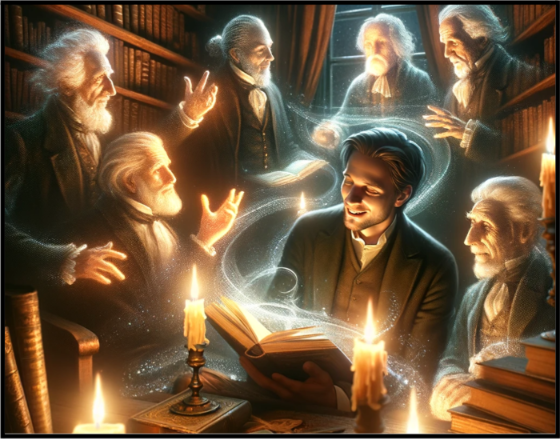Talking Big Ideas.
“Reading is a basic tool in the living of a good life.”
~ Mortimer Adler
Mortimer Adler dropped out of school when he was 14.
The United States was about to enter the first World War and Adler was the child of German immigrants living in Manhattan. Assuredly, he felt the sting of anti-German sentiment.
Discrimination was intense. Innocent German Americans were tarred and feathered. Many were forced into internment camps. Others had their homes and businesses destroyed. German books were burned in the streets.
The experience may have encouraged Adler to cherish books – and commit to making something of himself. He signed up for night classes to become a journalist.
He would go on to earn a PhD from Columbia University, serve on the Board of Editors of Encyclopædia Britannica, and appear on the cover of Time for his role in bringing classic books to the masses.
Today, Adler is best known as the author of How to Read a Book. An instant classic when it was first published in 1940, it stayed at the top of the bestseller lists for more than a year and remains popular eight decades later.
Adler explains that there are two distinct ways to read. We can read to gather information, or we can read to increase our understanding.
Both are important. But reading to understand is transformational – and most people never properly learn to do it.
Adler calls reading to gather information “elementary reading.” We learn it early in school. The process is simple: Start at the beginning and read each word in order until the end.
Elementary reading can be useful for things like manuals, newspapers, and novels. But it has serious drawbacks. We are forced to follow the path the author sets for us. We feel constrained to read every word and finish whatever we start.
The focus is on passively consuming information or signaling to others how many articles and books we finish.
Reading to understand is active. We engage with the text. And we follow our curiosity, reading whatever we want on our terms. There’s no obligation to start or finish anything.
Patrick Collison, the bibliophile tech inventor, buys any book that captures his interest. He describes his house like this: “there’s books in the kitchen, there’s books in my bedroom, there’s books on my bed and just strewn everywhere.”
Collison says he doesn’t even start half the books he buys and finishes perhaps a third of the books he starts. Tyler Cowen, a polymath who famously reads hundreds of books a year, is even more ruthless: “I start ten or so books for every one I finish.”
Of course, not all of us have the discipline or time to read like Collison or Cowen. But we can still benefit from learning to focus on understanding while we read.
The key is to think like a detective.
Last year I wrote a piece called Your Big Idea. I argued that effective messaging begins with having clarity on your big idea. This is core to reading as well as speaking.
Adler suggests you build a habit of hunting for the big idea. This is how he puts it:
Think of yourself as a detective looking for clues to a book’s general theme or idea, alert for anything that will make it clearer. . . . You will be surprised to find out how much time you will save, pleased to see how much more you will grasp, and relieved to discover how much easier it all can be than you supposed.
Imagine you have a big presentation coming up and you’re nervous. You go to the library for advice and find two books to check out. You have about 30 minutes to read through them before leaving to pick up your kids.
Elementary reading would have you open the first book, start on page 1, and go as far as you can for the full 30 minutes. How much would you really learn?
Adler has you divide your time to give each book about 15 minutes. You dive into them like a detective looking for answers to these questions:
- What’s the big idea?
- How does the author make the case for the big idea?
- How does understanding this help me?
There’s no time to waste on elementary reading. Instead, you read the publisher’s blurb and the table of contents a couple of times to get a solid road map for the book. You read the conclusion and scan the introduction. You skim the appendix and index. You flip through the book for bold text, pictures, and highlights.
You focus on any sections of the book that will be specifically useful to you. You jot down notes along the way, doing your best to answer the questions above.
When 15 minutes is up, you move to the second book. Afterward in your car, you listen to a review from What You Will Learn or Blinkist that gives a solid summary of one of the books.
There are several books I want my clients to have on their bookshelves to help them grow as speakers, listeners, and leaders. I know they are super busy. I can’t ask them to read a bunch of books cover-to-cover like novels.
But they can have a few excellent books on hand as reference guides to quickly scan as needed, like a good dictionary or cookbook. I encourage you to do this as well.
Build a habit of playing detective when you read. As Adler said, “Skimming a book is always a good idea.”
***
![]() IDEA
IDEA
Liberate your reading. Play detective and hunt for the big ideas.
Pick up a book that you’ve been meaning to read. Set a timer for 5 minutes. Challenge yourself to see how much of the skeleton you can absorb. Close the book when the timer goes off.
What’s the big idea? Jot it down in your own words.
***
Farnam Street has a fantastic deep dive on Adler’s book as part of their Reading Better project. It’s worth bookmarking.
If you find this useful, please subscribe to our free weekly newsletter.




